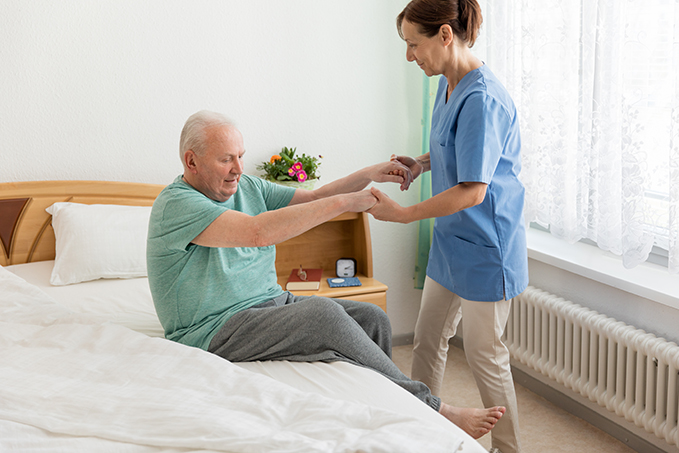One in ten aging adults experience bed sores, and those chances increase in people who smoke, live with chronic health conditions like diabetes, and in seniors who have naturally thin or delicate skin. Bed sores are not merely extremely painful – they can easily progress to infections that can become life-threatening.
Also known as pressure sores, bed sores are caused by a lack of blood flow when remaining in one place for an extensive period of time. Seniors who are confined to a wheelchair or bed or people with limited mobility often have a never-ending battle against bed sores, so it’s crucial for those providing care for an elderly loved one to learn about bed sore prevention. How can you prevent bed sores in older adults? These tips can help protect your loved one’s vulnerable skin from painful and dangerous sores:
Know Where to Use Supportive Devices
- Position specialized pads and cushions:
- Underneath calves to protect heels
- In between knees and ankles
- To lie at an angle, protecting hips
Change Positions Often
- Help the senior change position every couple of hours if bed-bound or every hour if wheelchair-bound.
- Utilize lifting devices to prevent friction while repositioning.
Help With a Healthy Diet and an Active Lifestyle
- Encourage the person to quit smoking.
- Consult with the senior’s doctor for dietary and supplement tips for optimum skin health.
- Implement daily exercises per doctor’s recommendations.
- Improve hydration.
Maintain a Skin Care Regimen
- If the skin is too moist, apply talcum powder.
- Wash the skin with a gentle soap and warm water, and apply lotion.
- Massage areas subject to pressure sores to boost circulation.
If the person develops a bed sore despite taking the proper preventative measures, it may advance through these four stages:
- Stage 1: A bruise-like patch can develop on the skin which may be warmer compared to surrounding skin. The area may itch or burn.
- Stage 2: An open sore appears from the bruise. This can look like an abrasion or blister and be painful and discolored.
- Stage 3: As the sore becomes worse, the surrounding skin darkens and the area is deeper.
- Stage 4: During this stage, damage occurs to the bone, muscle, and/or joints, and a bone infection known as osteomyelitis or even sepsis (a life-threatening blood infection) could occur.
Contact the person’s health care provider as soon as possible if a bed sore appears. Happier Home Care can also help by performing daily skin inspections to detect vulnerable regions of the skin and the early signs and symptoms of bed sores. We can also help with transferring, position changes, and walking to lower the risk of developing bed sores. Our professional home care services and care team are just a phone call away. To learn more about our elder care in Pasadena or the nearby areas, contact us online or at 818-651-6679.
